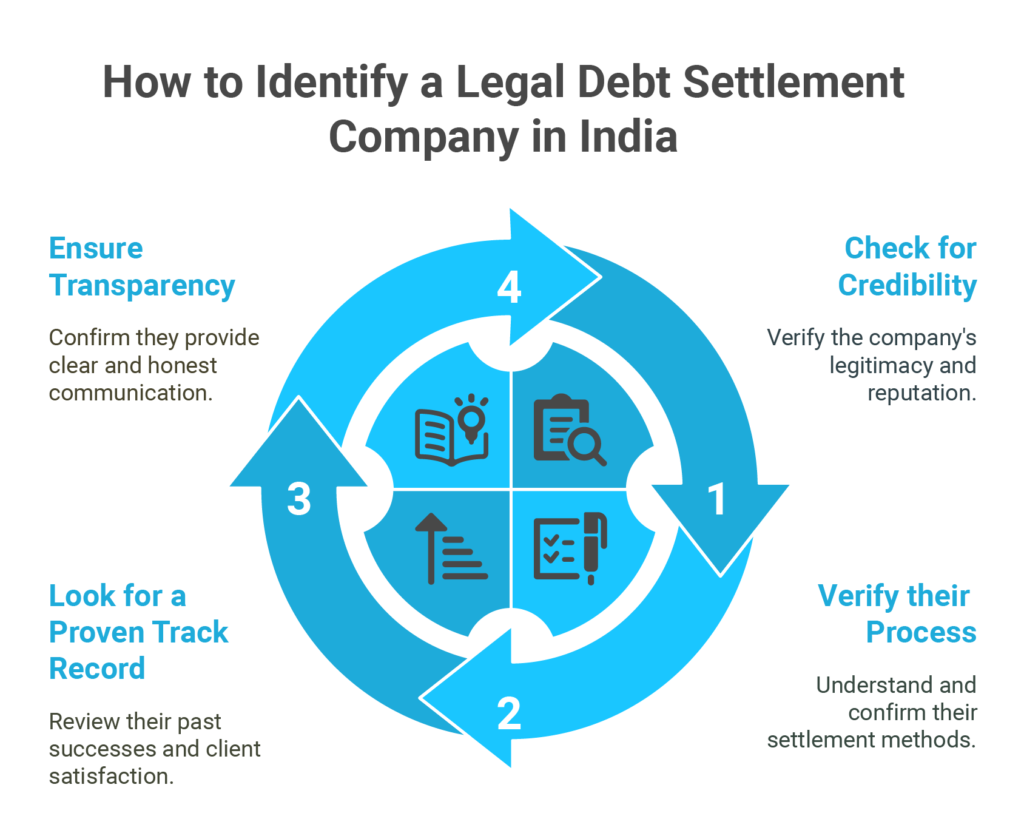

Do you know that thousands of Indians fall victim to fraudulent debt settlement agencies every year, losing their hard-earned money to scam artists who promise financial relief but deliver nothing?
In recent years, the rise of loan settlement fraud in India has left many borrowers trapped in deeper financial distress instead of finding a way out. This report highlights how unregulated players in the debt settlement industry exploit desperate borrowers by charging high upfront fees and making false guarantees of reducing loan burdens.
If you are struggling with debt and looking for a way to settle it, you need to be extremely cautious. Fake debt relief companies in India use manipulative tactics to trick borrowers into parting with their money. In this article, we will uncover the most common debt settlement scam warning signs in India, how to identify them, and how to ensure you only deal with legal debt settlement companies.
Here’s something most people don’t realize—debt settlement companies in India don’t fall under the same regulatory scanner as banks or NBFCs. There’s no specific watchdog keeping tabs on their day-to-day practices just yet. That means the responsibility to choose wisely falls squarely on the shoulders of borrowers.
Think of it this way: just because a company has a shiny logo doesn’t mean it plays fair. Paperwork might check a box, but it doesn’t vouch for integrity. That’s why it’s crucial to partner with firms like Settle My Loan, where transparency, ethical conduct, and customer trust aren’t just marketing buzzwords—they’re how we do business.
Ramesh, a 35-year-old IT professional from Bengaluru, was drowning in credit card debt. A company promising “Guaranteed 50% Loan Waiver” contacted him through a cold call. They claimed to have “special arrangements” with banks and demanded a ₹50,000 upfront fee to start negotiations. Desperate for relief, Ramesh paid the amount. Months later, he realized no action had been taken. The company had vanished, and he was left with even more penalties on his unpaid debts.

With so many fraudsters in the market, how do you differentiate between genuine and fraudulent debt settlement agencies in India?
✔ Check for Credibility: Look for legitimate online reviews and verify if the company has resolved complaints.
✔ Verify their Process: Genuine companies explain their process in detail and do not ask for upfront fees.
✔ Look for a Proven Track Record: Debt settlement agency reviews in India will give insights into their success rate.
✔ Ensure Transparency: A legal debt settlement firm provides a written agreement with clearly outlined terms. Moreover, visit the company’s physical office before signing any agreements. If they only provide a P.O. box or WhatsApp number, consider it a red flag.
If you’re looking for a reliable and legal debt settlement service in India, Settle My Loan is an established platform that helps borrowers settle their debts through legitimate negotiations with creditors without falling into scams.
Unlike fraudulent debt settlement agencies in India, Settle My Loan:



Visit Settle My Loan to explore safe and legal debt relief options.
Debt settlement scams are increasing in India, preying on financially vulnerable individuals. Loan settlement fraud in India often comes disguised as a too-good-to-be-true offer, luring borrowers with promises of quick debt forgiveness. By recognizing the debt settlement scam warning signs in India and choosing reliable debt relief services, you can protect your financial future.
Settle My Loan provides FREE walk-in consultation at the office location between 9am to 6pm even on weekends.
Stay alert, do your research, and only trust proven, legal debt settlement companies.
🔗 RBI Guidelines on Loan Settlement
🔗 How to Identify Debt Scams in India
In order to avoid scams involving settling of debt, never give in to the promises of guaranteed debt forgiveness or settlement amounts that are unimaginably low. You should never advance huge sums as up front fees prior to the service delivery. Find out all you can about a company, look out for real testimonials of their clients, and establish their credibility and their record. Lastly, make sure that they provide open communication and have a good knowledge of the whole settlement process.
Debt settlement should be legal when done properly and can be effective to solve excessive debt. It has however blemished its name due to scams involved. The trick is to differentiate between the legitimate agencies which clearly bargain with the creditors and short-changing agencies which give unrealistic claims. This should always be done by looking at companies that have definite procedures, that do not charge upfront money, and those that can be proven to be successful.
Unfortunately, yes. People were so blind as to believe that they can get rid of their debt fast and without spending money at all offered to them by various schemes of fraudulent debt relief companies that cheated many a customer. These scams may require upfront money or get you into a deal that puts you further into debt and you end up with more debts but you are still not in any better position. Settling of true debts involves a lot of tactful negotiation and realistic appreciation of what is feasible.
In most cases, the banks will not directly reimburse the lost money because of being caught up in the debt settlement scam because in most instances, the deals initiated by the individual contemplating the same may be under false pretension but still considered as a deal made by the individual. The person, mostly, you would sue would be the fraudulent company. Nevertheless, in case of the scam related to the unauthorized transactions, it is essential to contact your bank and report the scam right away because the latter can help investigate or further prevent the loss.
Prevention is the best way dealing with credit scams and frauds, this is why you should be careful of unsolicited offers that appear too good to be true. One should not provide personal financial data, including the accounts in banks, OTPs to uncredible interlocutors or via shady links. Periodically check your credit report and ensure every account you have is access-protected with hard-to-crack passwords.
Higher pressure techniques are common amongst fraudsters who look to give a sense of urgency in order to get you to act without thinking. They may guarantee the clearing of debts instantly or engage in hard selling. The other scam is to require high front fees without even starting to negotiate the debt. They will often pretend to be legitimate organizations or the government in order to have your confidence.



